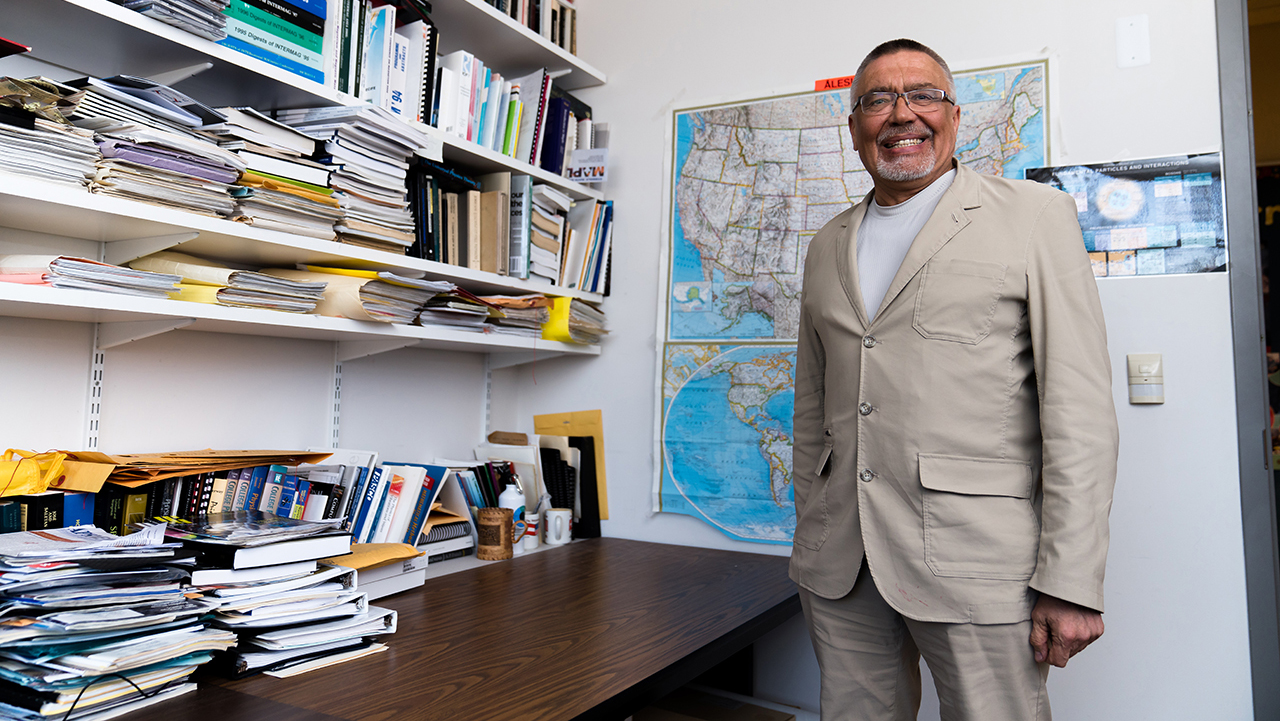Oakland Distinguished Professor of Physics Andrei Slavin was recently named a ScholarGPS Highly Ranked Scholar, ranking No. 1 in the Lifetime Spin Wave category.
“It was quite unexpected that I obtained this ranking and I was truly astonished,” Slavin said. “I’m very proud that the scientific community decided that I reached the peak in this field, which is very important to me. It’s a recognition, which I never expected. It's not only my achievement, it's an achievement of our institution and the climate created in the Physics Department.”
Slavin said he’s worked closely with the two people ranked just below him: Burkard Hillebrands from the University of Kaiserslautern in Germany and Sergei Demokritov from the University of Munster in Germany.
“I know Dr. Hillebrands and Dr. Demokritov very well, and have many collaborative papers with them,” Slavin said. “I'm very proud that somehow the experts of ScholarGPS decided that I ranked No. 1, but it’s not necessarily important who is No. 1 or 2 or 3, the important thing is that they recognize our joint contributions to the field.”
Slavin is an expert in spin waves, which are excitations of electron spin density that propagate through a magnetic material. Spin waves could fundamentally change how magnetic devices carry and process information. These waves, also known as magnons, could form a macroscopic quantum state called Bose-Einstein condensate at room temperature. This phenomenon is fundamentally important in physics.
“Spin waves are slow compared to electromagnetic waves,” Slavin said. “They are 1,000 to 10,000 times slower than electromagnetic waves, which means if you convert a signal from electromagnetic wave to spin wave you can reduce the wavelength about 1,000 times and you can miniaturize the signal processing equipment working at the electromagnetic frequencies. Using spin waves creates a huge advantage in signal processing.”
Slavin is thankful to be doing his research at Oakland, which allows him the freedom to follow his passions.
“I would like to thank the administration of Oakland and my colleagues because they have created a comfortable working environment, where I’m able to express myself and realize my scientific goals to their full extent,” said Slavin, who has been at Oakland since 1991. “I’m a theorist and I’m always interacting with four or five different experimental groups in Europe and the United States. We have been doing a lot of interesting work and applying for research grants together. During my time, I think I’ve brought in more than $4 million in external funding to Oakland University.”
Slavin, who is the Chair of the Physics Department, is also very proud of the department he’s helped put together at Oakland.
“I'm glad that during my more than 30 years at Oakland, I was able to assemble a Physics Department that is truly an outstanding and internationally recognized group,” Slavin said. “Physics faculty are scientists who are teaching students and doing research that brings visibility to Oakland. If we will analyze the scientific rank of my colleagues at Oakland, we will see that they're also very highly placed in their respective fields.”
Slavin said he’s currently working on applying for several grants and he’s excited for what the future can possibly bring.
“We're trying to create an absolutely new technology based on antiferromagnets, which will work at very high frequencies, in the so-called terahertz frequency gap, where it's very difficult to generate, receive and process signals,” Slavin said.


 May 31, 2024
May 31, 2024







